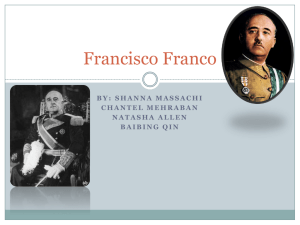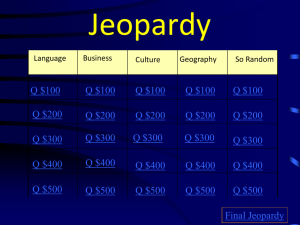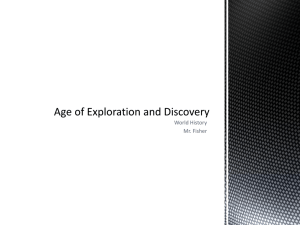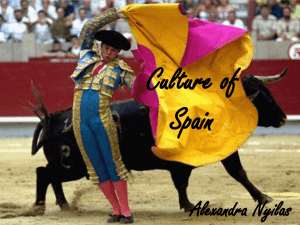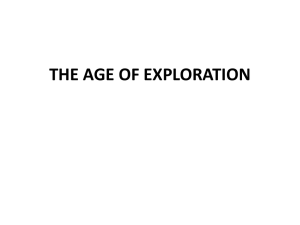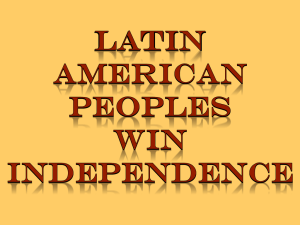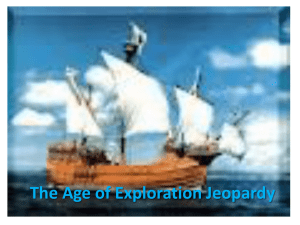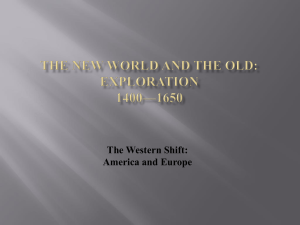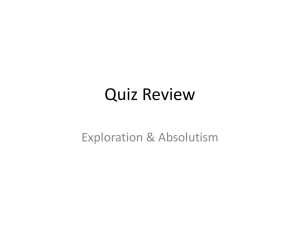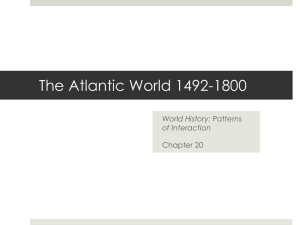Critical Cause and Effect The Columbian Exchange
advertisement
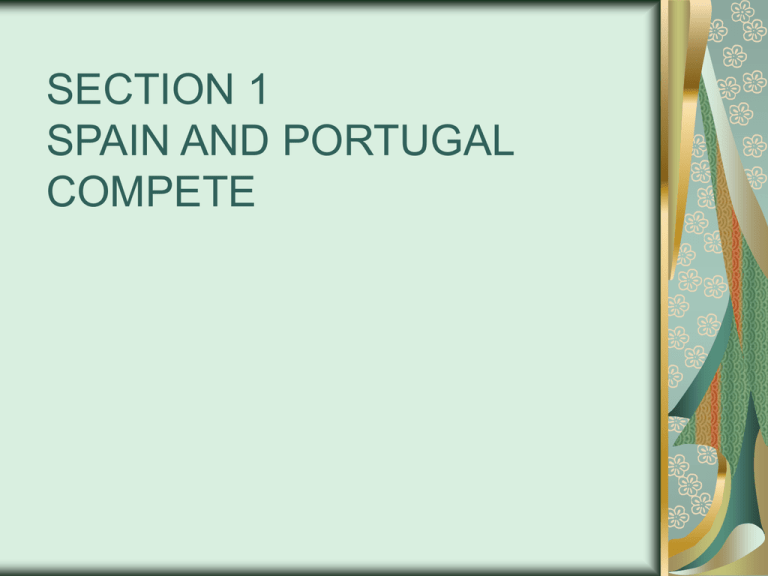
SECTION 1 SPAIN AND PORTUGAL COMPETE What is the Line of Demarcation imaginary line around the world – Portugal could claim all non-Christian lands to the east of the line. Spain could claim the nonChristian lands to the west. Why did Spain and Portugal want to control territory in the Americas? Spread of Christianity – missionaries Expand their empire Wanted to become rich They could gain power and security What was the Treaty of Tordesillas moved the line 800 miles farther west. How did the Treaty of Tordesillas affect Portugal? Allowed Portugal to claim much of eastern South America, which later became the colony of Brazil What is Mercantilism? when a country had a favorable balance of trade if it had more exports than imports. How did colonies help with mercantilism? Provided mines that produced gold and silver Produced crops that could be traded for gold and silver They served as a market for the home country What did each of the following explorers accomplish? Amerigo Vespucci Found a new continent that a map maker called America after him. Vasco Nunez de Balboa Led an expedition through the jungles of Panama and reached Pacific Ocean. Claimed the area for Spain Ferdinand Magellan Killed in a local war in the Philippines but his crew was the first to sail around the world. Hernando Cortes Led several battles in Central America where they defeated the Aztecs and took over the land for Spain. Spain built Mexico City there. Francisco Pizarro Defeated the Incas for Spain. Took the area and named it Peru. What were the 4 reasons for Spanish Victories? Spread of European diseases Excellent soldiers and sailors – superior weapons Made alliances with Native Americans who were enemies of the Aztecs and Incas Conquistadors acted brutally toward Native Americans under their control SECTION 2 EUROPEAN COMPETITION IN NORTH AMERICAS Why did these explorers search for the Northwest Passage? Cabot Wanted to claim the land for England Voyages basis for future English colonies along North America’s Atlantic shore Verrazzano – French – explored Atlantic coastline of North America but no passage found Cartier – traveled up St. Lawrence River to today’s Montreal What caused the conflicts between the English, French and Spanish? Spain claimed the land under Treaty of Tordesillas Religious conflicts in Europe like Reformation Spain and French Florida became battle grounds Huguenots – colony called Fort Caroline Spanish – build fort – St. Augustine – then brutally massacred the French Spain and England Religious differences Quest for national power English sea dogs attacked Spain’s galleons that brought gold and silver from the Americas Sir Frances Drake Raided Spanish ports and ships in South America Became the first Englishmen to sail around the world What led to the destruction of the Spanish Armada? - 130 ships Met in English channel English ships darted among Spanish warships firing deadly cannon rounds Spanish crippled and retreated but was hit by a severe storm – barely made it home Spain still strong – rebuilt navy and maintained its large colonial possessions but never as powerful as they were before English victory – two important effects England remained independent and Protestant Spain’s image suffered – it showed they could be beaten. What was the goal of the colonies of Quebec and New Amsterdam? Quebec First permanent French settlement in North America Opened a rich fur trade with local Native Americans New Amsterdam Located on current sight of New York Thriving fur trade with Native Americans SECTION 3 THE SPANISH AND NATIVE AMERICANS What steps did Spain take to govern lands in the Americas? Two provinces – New Spain and Peru Called Viceroyalty – ruled by viceroy Roads allowed soldiers to move quickly from place to place How did the Spanish manage the economy of the American colonies? Encomienda – a grant of Native American labor Worked on haciendas to grow cash crops – coffee and cotton Built new roads to transport people and goods across empire Roads allowed gold and silver to be transported efficiently to the coast and then to Spain How was Spanish colonial society organized? Spanish born Creoles – people of Spanish descent born in colonies Mestitoes – Spanish and Native American mix What role did the Catholic Church play in the Spanish colonies? Missions – included a church, town and farmland To convert Native Americans to Christianity Increased Spanish control over land Helped Native Americans to create a better supply of food Offered protection against enemies Taught them how to read and write Developed skills such as carpentry and metalworking Why did many Native Americans grow increasingly unhappy with the Catholic missions? Missionaries worked them as if they were slaves Tried to replace religions and traditions Forced to work on plantations How did the plantation system affect Native Americans? Hispaniola – forced native Taino to work on sugar plantations – many suffered and died Who was Bartolome’ de Casas? Catholic priest – had trouble serving God and enslaving Native Americans Gave up his claim to Native Americans Fought against the abuse of Native Americans – “Protector of the Indians” How did the Columbian Exchange contribute to the spread of disease in the Americas? Transfer of germs from Europe – smallpox, measles and influenza What were some of the beneficial effects of the Columbian Exchange? Brought many plants and animals – cattle, pigs, horses, grapes, onions and wheat American crops became part of European diet – potatoes and corn These crops fed populations that might have gone hungry. Critical Cause and Effect Back to Transparencies BACK TO LESSON The Columbian Exchange Back to Maps SECTION 4 BEGINNINGS OF SLAVERY IN THE AMERICAS What forms has slavery taken through history? Some societies slaves were domestic servants in wealthy households Some labored in mines and fields Often enslaved when captured in battle or sold to pay debts Some treated with respect Allowed to marry and own property Children allowed to go free What are the four reasons for enslaving Africans? Immune to European diseases Had no friends or family in North America to help them resist or escape A permanent source of cheap labor – children could be held in bondage They had worked on farms in their native lands Why did the slave trade increase between 1500 and 1800? Colonies then increased demand by wanting slaves also and became dependent on slaves What groups participated in the slave trade? European slave traders Rulers of West African kingdoms Slaves were traded for European goods – textiles, ironware, wine and guns How did the slave trade affect African societies? Made coastal African kingdoms rich but weakened inland African societies How many Africans were enslaved and shipped to the Americas? 12 million shipped before it was ended 2 million died during voyage Why was their voyage called the Middle Passage? Middle Passage was voyage from Africa to Americas Middle leg of the triangular trade Between Europe, Africa and Americas What conditions prevailed on slave ships? Crammed into spaces so small – not enough room to stand Foul smells, disease and shrieks and groans of dying made it a terrifying experience What happened to enslaved Africans once they arrived in the colonies? Sold at an auction Forced to do hard labor Fed and housed poorly Slaves resisted by trying to run away or rebelled How did slavery influence racial attitudes among Europeans? Slavery associated with black Africans Dark skin became assign of inferiority Led to racism Lasted 400 years What part did the slave trade play in the Columbian Exchange and how did Africans influence culture in the Americas? Vast knowledge about farming and animals Sweet potatoes, peanuts and chilies Strong artistic heritage of dance, music and storytelling

